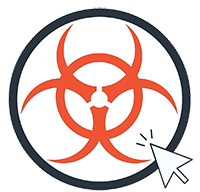As technology advances at an electric pace, cyber attackers continue to develop increasingly sophisticated and complex methods of gaining unauthorized access to both business and individual data. Cybercriminals often look to exploit weak points and vulnerabilities in a company’s security structure and practices. Some of the most common forms of cyber-attacks are phishing, malware, and ransomware. Here we look at 3 specific cyber threats executed by cyber attackers, and how you can ensure your business does not become part of the worrying statistics.
Malware
Malware is the blended word for malicious software. Malware encompasses a variety of software variants including worms, trojans, viruses, and spyware. Cybercriminals write the malicious programs before they manipulate you into installing them in your system. The installation occurs when you open questionable links and emails. Once they are in the system, the malware will cause damage in the following ways:
- A virus will embed itself in the code of another program and force the program to do something it is not designed to do.
- A trojan presents itself as something valuable to a user so that the user clicks it to activate its malicious capabilities.
- Spyware secretly collects important data before sending it to a third party for access by criminals.
Phishing
Phishing, a cybercrime tactic that has been around since the 90s, involves trickery to help reach essential credentials like revealing login passwords and card details. Once the cyber attackers get hold of such information, they can use it to breach a system, transfer funds and other criminal activities. During a phishing attempt, a user receives an exciting email or message via social media. Upon clicking, the user is directed to a replica page that requires them to input their credentials, unaware that they are giving their details away. Another form of phishing involves targeted downloads that install malware. To make matters worse, the dark web sells phishing kits and other resources to aspiring attackers.
Ransomware
Ransom is a word synonymous with kidnapping, which is essentially how ransomware as a cybercrime works. Ransomware is software that attacks a computer intending to restrict access until the owner of the computer pays a dictated amount of money to regain access. A pop-up will appear on screen with instructions on how to go about payment, which is often needed in the form of digital money such as cryptocurrency due to its anonymity.
Staying Safe from Cyber Crime
Most cyber-attacks are related. For instance, a phishing attack can open the doors to a malware attack. For this reason, preventive measures are quite conventional and relative. They include setting up a working data backup mechanism, ensuring you use up-to-date software, having an updated antivirus, and scanning all new software before installing. In the business space, be keen on raising awareness about following unproven links and emails.
Stay vigilant to avoids the traps of phishing attempts by:
- Double-checking links for HTTPS rather than HTTP protocol.
- Change passwords regularly.
- Only secure and encrypted networks on your computers.
- Purchase your apps from recognized, trusted sources and read reviews before transacting.
Finally, report all cyber attempts to relevant bodies that fight cybercrime.
A successful cyber-attack, however mild, can leave your business struggling in terms of reputation as clients and business associates lose trust in you. For individuals, cybercrime could see you lose all your life savings. So, it is advisable to invest in cyber-attack prevention measures because you can never tell when disaster will strike. You can protect yourself and your company by implementing the best, yet fundamental technological defenses against malware, phishing, and ransomware attempts.
At Kontex our ethos is to leverage an organisations existing technology investments over selling more tools! Quite often tools are being underutilized. We provide the best talent in the industry to identify any weaknesses, providing you with unbiased advice on strengthening your organisations security posture.
Contact us for more information
 Under Attack?
Under Attack?

